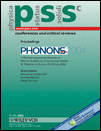Magnetic field dependence of the acoustic two-pulse echo envelope modulation in Si:B at very low temperatures
Abstract
At temperatures below about 30 mK in Si:B the phase relaxation time T2 of the two-level systems associated with the acceptor ground state can be determined from the decay of the two-pulse echo. It has been shown to depend on the concentration of interacting resonant states if the latter is high enough. This concentration is not only given by the boron concentration but depends also on internal and external stress, and the magnetic field. Under conditions of low concentration T2 becomes long and we observe a modulation of the echo decay. From its dependence on magnetic field strength we can associate this modulation with the interaction of the acceptor hole with the 29Si nuclei (I = 1/2) present within the extended acceptor wave function. The interaction with the central boron nucleus does not seem to contribute to the observed modulation. (© 2004 WILEY-VCH Verlag GmbH & Co. KGaA, Weinheim)




